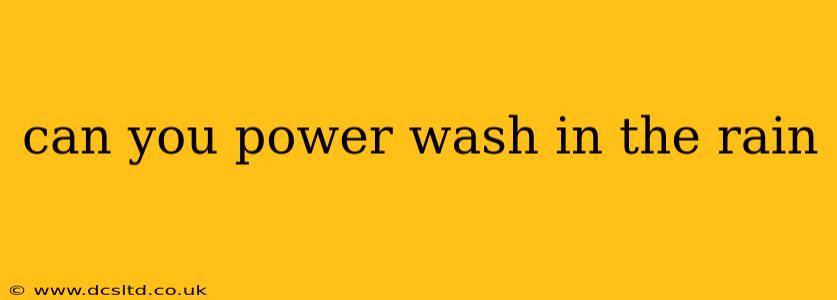Can You Power Wash in the Rain? A Comprehensive Guide
Power washing is a fantastic way to clean everything from your driveway to your siding, but the question of whether or not you can do it in the rain is a common one. The short answer is: generally no, you shouldn't power wash in the rain. While it might seem like the rain would help rinse away the dirt, there are several reasons why this is a bad idea. Let's delve into the details.
Why You Shouldn't Power Wash in the Rain
Several factors make power washing in the rain unsafe and ineffective:
-
Electrical Hazards: Water and electricity are a dangerous combination. Rain significantly increases the risk of electric shock, particularly if your power washer isn't properly grounded or if there's any damage to the electrical cord or components. This risk is significantly elevated during thunderstorms.
-
Reduced Effectiveness: While it seems counterintuitive, rain actually dilutes the cleaning solution and reduces the power washer's effectiveness. The water pressure is dispersed, and the cleaning solution gets washed away before it can effectively clean the surface.
-
Safety Concerns: The added slipperiness of a wet surface makes it much more difficult to maintain your balance and control the power washer. This increases the risk of accidents and injuries.
-
Damage to Surfaces: The combination of water pressure and rain can sometimes lead to more damage to certain surfaces, particularly delicate materials like wood or painted surfaces. The force of the water, combined with the already-present moisture, can penetrate deeper and cause damage.
-
Poor Visibility: Rain can obstruct your vision, making it harder to see what you're cleaning and increasing the risk of accidentally damaging plants, windows, or other features.
What Happens if You Power Wash in the Rain?
The consequences of power washing in the rain can range from minor inconveniences to serious hazards. You might experience:
-
Ineffective Cleaning: Your cleaning results will be significantly less satisfactory. The dirt and grime will not be adequately removed.
-
Wasted Time and Resources: You'll expend energy and cleaning solutions without achieving optimal results.
-
Electrical Shock: This is the most serious risk, potentially leading to injury or even fatality.
-
Property Damage: You could accidentally damage your property due to reduced visibility or the increased force of the water on already-damp surfaces.
What are the best conditions for power washing?
Ideally, you should power wash on a dry, overcast day. Avoid direct sunlight, as this can cause the cleaning solution to dry too quickly and leave streaks. A slightly cloudy day provides excellent lighting without the risk of intense heat.
Can I use a power washer after it rains?
Yes, once the rain stops and the surface has had a chance to dry somewhat, you can power wash. This is usually the preferred time, as the initial rain will have loosened some of the dirt and grime.
How can I safely power wash?
-
Always use a Ground Fault Circuit Interrupter (GFCI) outlet to reduce the risk of electric shock.
-
Wear appropriate safety gear, including safety glasses, gloves, and sturdy shoes.
-
Keep a safe distance from the power washer nozzle.
-
Be mindful of the surroundings and avoid directing the spray at delicate surfaces or people.
By following these safety precautions and choosing the right weather conditions, you can ensure a safe and effective power washing experience. Remember, safety should always be your top priority.
